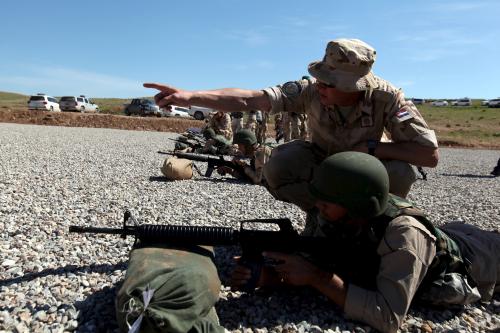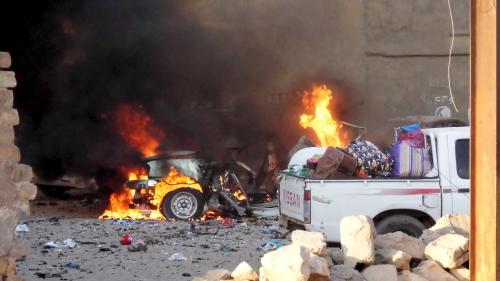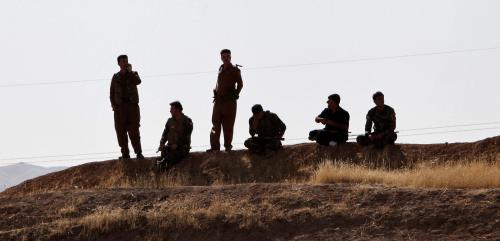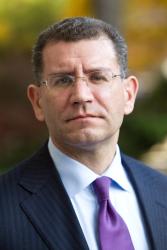The campaign to liberate Mosul—Iraq’s second largest city—has been in the works for months and, depending on who you ask, is in some stage of ramping up or is already underway. The military campaign is still far from finished, but it is becoming increasingly likely that the present coalition of Iraqi Security Forces (ISF), Peshmerga, Hashd ash-Shaabi (or Popular Mobilization Units), an assortment of local militias, and a generous dose of Western assistance and support will recapture the city. Indeed, even Islamic State spokesmen have acknowledged the precarious position of their territory.
However, the growing push to retake the city threatens to replicate an unfortunately common American experience in the region: catastrophic success. There is widespread awareness of the impending humanitarian and political crises that could follow liberation, but too little has been done to minimize—much less resolve—these inevitable challenges. The near singular focus of the United States on destroying the Islamic State is unfortunately obscuring a potentially graver threat to U.S. regional interests: the renewal of civil war in Iraq.

Attacking the symptom, not the disease
The United States is justifiably determined to see the Islamic State (also known by its Arabic acronym Da’esh) driven out of Iraq, but ultimately the group is merely a horrifying symptom of much greater failures in the region. The destruction of Da’esh—or more realistically the loss of its territory as it is forced to revert back to its guerrilla/terrorist origins—will likely expose the deep sectarian tensions and grievances that have been somewhat masked by the common struggle against it.
In 2014, Da’esh pulled off its incredible sweep of conquest through northwestern Iraq in great measure due to the Sunni community’s marginalization by the Maliki government’s sectarian abuses. Prime Minister Haider al-Abadi’s election was an important step forward, but it has not yet been translated into demonstrable reconciliation and empowerment of the Sunni community, especially at the highest levels where the history of civil wars demonstrates it is of paramount importance. Instead, the experience and abuses (real and imagined) of government-supported Hashd ash-Shaabi forces participating in the liberation of Sunni cities, including Ramadi and Fallujah, has threatened to reignite wider Sunni-Shiite violence. Abadi’s recent confirmation of Hashd ash-Shaabi participation in the liberation of Mosul has been met with serious objections from an otherwise fractured Sunni leadership. While the Hashd ash-Shaabi certainly provide some military benefit, at the very least through sheer numbers, their presence in an already volatile situation could dangerously exacerbate these sectarian tensions.
The Kurdish Peshmerga have been widely recognized as the most effective force fighting Da’esh. However, Kurdish successes have also raised tensions with their nominal coalition partners. As the Peshmerga continue to advance beyond the previous borders of the Kurdistan Region and liberate non-Kurdish towns and villages, the local Sunni Arab population, Baghdad, and other actors feel increasingly threatened. At the very least, such Kurdish advances threaten to radically revise Iraqi’s territorial status quo. As the similar experience in Syria demonstrates, the shared fight against the Islamic State may not be sufficient to deter fighting between U.S. partners.
As is so often the case in the Middle East, the situation is still more complex. The Arab Sunnis are far from a united bloc, and a not insignificant number have—willingly or not—sided with Da’esh. Two of the most important Sunni leaders are the current Nineveh governor, Nofal Hammadi, and the recently-removed former governor, Atheel al-Nujaifi, who now leads a large Turkish-backed Sunni militia, the Hashd al-Watani. Both men, who ominously command thousands of fighters, are jockeying against each other and trying to leverage Baghdad as they prepare for the Mosul operation. This combination of competing ethno-sectarian claims and a welter of armed groups—all determined to participate in, if not lead, the liberation of Iraq’s second-largest city—create a dangerous combination of abundant kindling and too many people striking matches. Until now, serious communal violence has largely been averted by the necessity of defeating the universal threat posed by Da’esh, but the fall of Mosul could change the balance. At the very least, there could be considerable score-settling throughout as Da’esh is pushed back and returnees confront collaborators.
This combination of competing ethno-sectarian claims and a welter of armed groups…create a dangerous combination of abundant kindling and too many people striking matches.
Impending humanitarian crisis
The projected number of displaced persons expected to flee Mosul that will need assistance ranges from 100,000 to over a million. Dealing with such a large number of people under ideal circumstances would be difficult, much less in a war-ravaged environment beset by sectarian tensions, semi-functional governance, and an abundance of armed groups. The United Nations, USAID, and other humanitarian organizations have been organizing extensively to care for this additional wave of internally displaced people (IDPs). However, there remains a tremendous resource gap for the already-overstretched humanitarian network as it attempts to prepare an already-overburdened country.
The experience of retaking other Da’esh-held cities included widespread destruction of infrastructure and consequently massive displacement of populations often lacking even basic necessities. Beyond the serious resource deficit, the neighboring northern provinces most likely to receive this new influx of IDPs are still struggling with the millions that fled previously, but it would be a logistical and political nightmare to try to move large numbers of Sunnis into the Shiite south. This could be another iteration of the all-too-common story in today’s Middle East: conflict creates population displacement, which destabilizes neighboring areas, causing a spillover of violence, only for the pattern to repeat.
The missing piece
According to many would-be participants, the United States still has no serious proposal for a political and security framework to address the fundamental governance challenge of a liberated Mosul—despite U.S. officials recognizing its central role in securing genuine stability. The Abadi government, while certainly not actively instigating sectarian divisions, has made frustratingly little progress on integrating Sunnis. The recent sacking of Defense Minister Khaled al-Obeidi, a Sunni from Mosul, during the buildup of the Mosul operation is only the most recent demonstration of this self-destructive tendency.
Da’esh exposed the obvious failures of Iraq’s current political structure, but without significant structural reforms and meaningful improvements in governance, Iraq will remain vulnerable to the “son-of-Da’esh.” However, there are some constructive proposals that the United States could consider and develop. Dylan O’Driscoll of the Irbil-based Middle East Research Institute recently released a report that supports the creation of a federal region for Nineveh (and perhaps encompassing additional Sunni areas). He also advocates further decentralization at the sub-regional level to empower and protect the numerous ethnic and religious minorities. Variants of this federal model have been proposed before, but ultimately such a dramatic structural change is highly unlikely absent serious American leadership.
It’s not all bad?
One minor bright spot has been the rehabilitation of the United States in Iraqi politics since 2014 following the rise of Da’esh and the near-collapse of the state. American military support is almost universally recognized (grudgingly by some Shiites) as playing a critical role in defeating Da’esh. There is even more widespread recognition that only Washington could secure the financial aid to alleviate Iraq’s fiscal nightmare in the aftermath of the collapse of global oil prices.
Consequently, the United States enjoys real political leverage in Baghdad again through this military and economic support. While there is certainly no proposal to return anywhere close to pre-2011 levels of involvement, many Iraqis are actively calling for greater American leadership in pushing a realistic and durable political solution. The next few months will probably witness the liberation of Da’esh’s largest city and de facto capital in Iraq, but a much more complicated challenge looms on the horizon.







Commentary
Racing to the finish line, ignoring the cliff: The challenges after Mosul
September 19, 2016